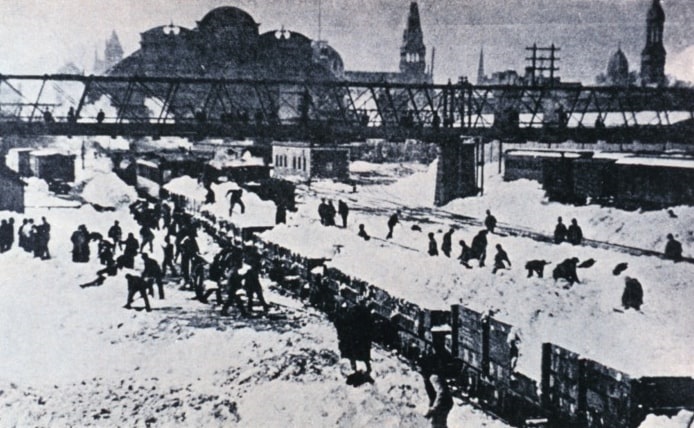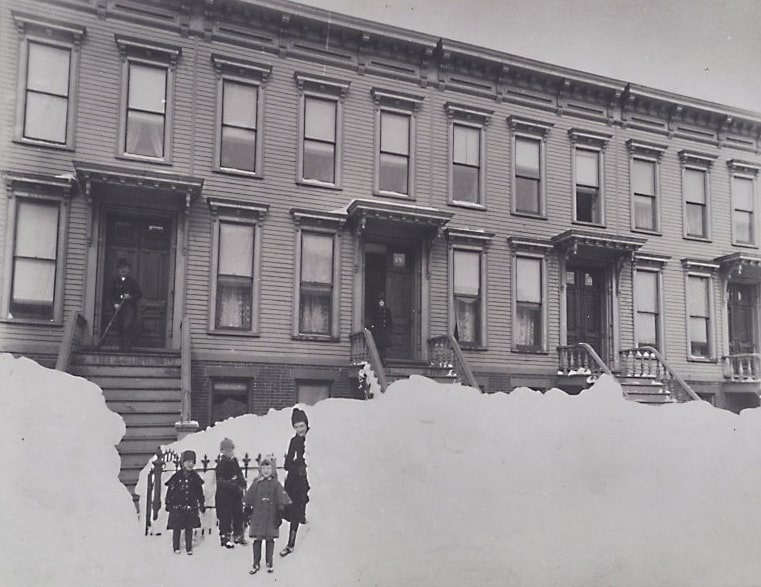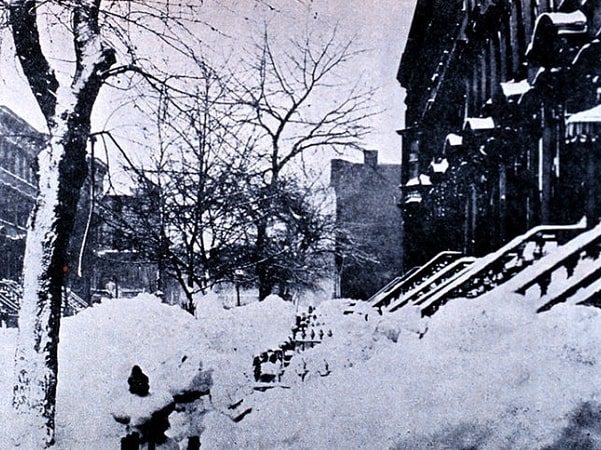Genealogists today want more than just names and dates on a family tree: they want to know the stories of their ancestors’ lives. What were they like as individuals? What experiences did they have? What was going on around them?

If your ancestors lived on the East Coast in 1888, anywhere from Chesapeake Bay to Maine, then they suffered through the worst winter has to offer on this day: Sunday, 11 March 1888, began a four-day onslaught now known as the Great Blizzard of 1888. New York, New Jersey, and parts of New England were hit especially hard, with up to five feet of snow!

Sustained, icy winds howled at nearly 50 miles per hour, piling up snow drifts dozens of feet high. Everything was frozen and shut down, including railroads and telegraph lines, and people were trapped inside their homes for days with supplies running out.
If your ancestor survived the Great Blizzard of 1888, then you know at least one extreme difficulty they faced in their lives, as the following newspaper article details.
Here is a transcription of this article:
THE CITY STILL SHUT IN.
Food and Coal Running Low.
The Milk Supply Exhausted and Prices Rising.
No Trains In or Out Except on the Pennsylvania Railroad.
Telegraph Wires Still Down and Telephone Connections Uncertain – The Elevated Roads Clear Again but No Surface Cars Able to Start – Many Belated Travellers.
When the New Yorker gazed out of his window on Monday morning [March 12] and saw something of a storm; when he gayly sallied forth and then hied him home after being tossed about like a piece of paper in a whirlwind and after serving as a silhouette in several sittings in various snow drifts; he admitted that he had got a new experience. But the was equally sure that he had the last of it. He had read a good deal about the blizzard and he was aware that the strange monster played fast and loose in Dakota and other Western wilds; but he was equally sure that one day in New York would be all the blizzard would dare to squander. At least he hoped so. Consequently, the New Yorker went to bed on Monday night a good deal shaken up but conscious of the superiority of New York over the rest of creation when backed up by the blizzard.
Laughing before He Was Out of the Drifts.
Yesterday morning [March 13] the New Yorker smiled and said to himself “Ha! ha!” when he rose from his bed and saw that the blizzard had seemingly departed, leaving huge heaps of snow in his wake and general demoralization. But it was only when the citizen of the metropolis sallied proudly and defiantly forth that he “gave himself away.” He first found that the surface cars were nowhere, that the surface tracks had been smothered by the whitening breath of the blizzard; that a solemn hush had fallen on the activity of the city, that there was no roar from the wheels on pavement and rail; that heavy express wagons, ponderous mail vehicles, thundering ice-wagons, tumultuous vendors, clattering milk wagons, the voice of the ragman, the cry of the “ole close” fellow, the rush of the cabmen and the babel of tongues and unmusical sounds, [were silent]. Was it he Sabbath day? No, it was Tuesday.
It was no ordinary silence. It was not the stillness of the tomb; for hundreds of beings were going about. Men with shovels were tossing snow hither and thither, vehicles were passing by. There was, in short, a panorama of activity on a scale of momentous quietude. What could it all mean? Every man felt uncomfortable. He stretched his muscles and went through the ordinary functions of existence – or tried to – and yet nothing was exactly natural. In consequence the New Yorker felt peculiar.
Thankful for the Elevated Road.
The first, the most salient, thing upon earth – or just above it – which gave the New Yorker a natural sensation was the elevated railroad. The horse cars were stuck in snow drifts or housed in stables, and the surface tracks snowed hopelessly under for the day, save for a stretch on Fourth Ave., but the elevated road was running. What a relief was that, my brethren! The elevated road did not seem exactly natural: its wheels were stiff in the blizzard’s breath; trestle and its trucks gave no click-it-a-click response to the wheels but, thank Heaven, the cars were going! The blizzard-stricken New Yorker piled himself upon the elevated road in tens, in hundreds, in droves, in regiments. He was tickled to death to find that there was such a thing as an elevated road; he was so tickled that he preferred standing to sitting. Bless the stars! The elevated road was running on every branch and the New Yorker was proud to stand on it. He would never again look sour when he had no seat.
About the Only Consoling Feature.
Yet the elevated road offered New York about all the consolation she had yesterday. Men rode downtown to business in the morning and they had all the air of beings who expected to do something. From noon until 1 o’clock they rode back again.
Wall Street men were a study. Some of them stayed at home. These, if they were “bears,” had an idea that the blizzard was a “bull” and might toss them uncomfortably high. Those who were “bulls” had a hectic fear that the blizzard was a “bear” and would hug them to death.
Consequently, the “bulls” and the “bears” did not go downtown numerously. They stayed at home and let the messenger boys declare the Stock Exchange closed at noon, if necessary. The grain and produce man did likewise, and naturally the cotton broker had no greater desire to attempt the blizzard in his den. The exchanges were as dead as a doormat, the attendance so slim that even petroleum refused to flow and metal was chilled steel. The exchanges closed at noon. No greater deference to the blizzard could be shown, for when the “bull” and “bear” cave in together they are in desperate straits.
The Railroad Embargo.
Passenger exit from and entrance into the city was as dead as on Monday; even deader, for no train with passengers arrived and none departed. From the Grand Central Station, a force of 500 Italians cleared one track as far as Mott Haven, and a relief train sent to transfer blockaded passengers returned without an additional occupant. The passengers had already reached the city by sleigh and by elevated trains. The snow was fifteen feet deep over the main tracks above the tunnel, and against this the energy of shovelers is to be directed today.
The prospects of the Central of New Jersey, the Pennsylvania and the Erie remained unimproved yesterday. Unfortunately, the apprehension existed among the officials of the New Jersey roads that cattle had been frozen to death in their freight cars.
With the lack of passenger transportation was united a failure in the receipt and dispatch of the mails. The only relief in this direction to be hoped for is from the shovels of the Italians.
A Milk and Coal Famine Threatened.
The scarcity of milk and coal in restaurants and hotels gives a taste of the power of the blizzard. In downtown restaurants there is milk enough for today; tomorrow, at present rates, coffee and tea may be had with sugar. The coal supply will last a day or two; then, if the blizzard wills it, tea and coffee may be had in the leaf with cold water.
The blizzard has given such a setback to the litigious fever that jurors were scarce in the Court House, and the noses of lawyers so blue that the judges – who had issued their mandamus to the blizzard (temporary) – adjourned case after case until the will of his Honor the Blizzard could be ascertained.
The Club houses were gloomy. The club man realized that the demon of Dakota glories over high living and the club man, therefore, passed the day and the evening unpleasantly.
The schools of the city were closed early in the day, a few scholars here and there appeared. But the teachers, more cheery, remained almost all at home and so the schoolhouse was left abandoned for the most of the day.
Even the vessels coming into port bore testimony to the inferior character of the New York blizzard. They had had no bad weather until on Sunday night [March 11] when they got off Sandy Hook. They then struck something worse than a cyclone.
Note: An online collection of newspapers, such as GenealogyBank’s Historical Newspaper Archives, is not only a great way to learn about the lives of your ancestors – the old newspaper articles also help you understand American history and the times your ancestors lived in, and the news they talked about and read in their local papers. Were any of your ancestors living on the East Coast during the Great Blizzard of 1888? Please share your stories with us in the comments section.
Related Articles:
